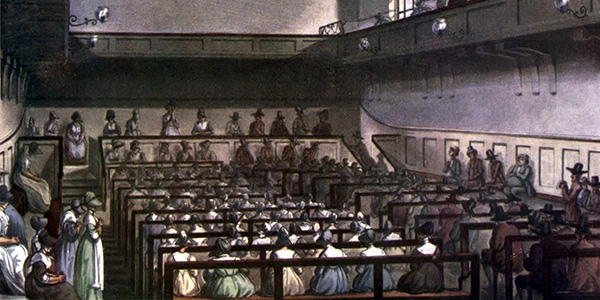
April 25, 2015, by Michael Jennings
Quakerism in Mansfield – an audio tour
Dr Frances Knight, Associate Professor in the History of Modern Christianity in the Department of Theology and Religious Studies, discusses the launch of an audio trail exploring the history of Quakerism in Mansfield.
George Fox, founder of the Religious Society of Friends (popularly known as the Quakers) had religious visions while living in Mansfield in the 1643s, and the town is where the movement starts.
Fox’s world was dominated by religious questions. In 1643, at the age of 19, and with the civil war already in progress, he began wandering round the Midlands, seeking out ministers, and formulating his own religious ideas. By 1646 he had broken away from the Church of England, and was becoming extremely anti-clerical. By 1647, he began to preach about the present accessibility of God. Rather than relying on the Bible, he believed that priority should be given to the Holy Spirit, and that each person should rely on an ‘inner light’ to guide them. He respected the Bible, but he didn’t see it as having ultimate authority.
Mansfield is also associated with Elizabeth Hooten, who was one of the first people to be converted to Quakerism by Fox. She began preaching by the late 1640s, and travelled extensively in order to spread her religion, including to America and the West Indies, where she died. From the beginning, Quakerism advocated and practiced equal rights for women.
The Mansfield audio tour has been created by four theology students from the University of Nottingham, with support from local historians in Mansfield, and staff at the University and the County Council. The tour can be followed by leaflet, or audio download, and involves a roughly circular walk around the town.
It starts at the Bus station, the site of the original Quaker Meeting House and burial ground. Among other points of interest, it takes in the sites of George Fox’s house, the alms houses founded by another Quaker, Elizabeth Heath, in the 17th century. The alms houses were for Quakers, and for members of the Church of England.
The tour also visits the clock tower of the old Metal Box factory, which is all that remains of a factory complex owned by three prominent Quaker families, Barringer, Wallace and Manners. Originally manufacturing mustard tins, Metal Box was a major company in the 20th century.
Another Mansfield institution is the Westfield Folk House, founded by a Quaker widow, Rachel Manners, in the 1920s. It is now a Youth Centre.
The tour sheds important new light on the history of Mansfield, and makes it clear that Quaker men and women have made a huge contribution to both Christian and secular culture, in Britain, and around the world.
A memorial plaque to the Mansfield Quakers will be unveiled and the heritage trail launched on Saturday 25 April from 5.30-6pm at Mansfield Bus Station.
No comments yet, fill out a comment to be the first

Leave a Reply